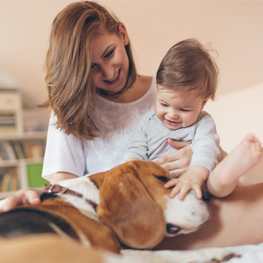
There’s a lot to think about when you’re having a baby. How are you going to adapt to a new addition? What is life going to be like? But you’re not the only one. During this exciting time, it’s important to remember the furry or scaly family members, too: your pets! Many pets get used to being the ‘only child’ in the family, so helping them adjust to having the new baby around might take a little work. The following tips can help make the introduction go as smoothly as possible, and someday your baby and your pet can become friends ‘fur’ life!
Slow and steady. Make sure you take things slow. You can begin by gradually reducing the amount of time you spend with your pet before your baby is born. If possible, you can also have another family member develop a closer relationship with your pet. These tips can help prevent a sudden change in the amount of attention your pet is used to receiving.
Passing the smell test. Keep in mind that newborns don’t act, smell, or sound human, which may confuse pets. Once your baby is born, you can introduce your pet to their scent before you bring them home. Give them a blanket or article of clothing to snuggle that belongs to your baby. Animals have a very powerful sense of smell, and they use it to get to know others. By giving your pet something that belongs to your baby, you will help them get used to your baby’s scent before they meet.
First impressions. While you might be excited about introducing your pet to your baby, you don’t need to do it right away. If your pet has gotten used to being the ‘only child’ in the family, take extra care when bringing home your baby for the first time. Animals can become jealous, aggressive, and defensive about trying to protect their place in the family. When you first arrive home after giving birth, have someone take your baby into another room. This will give you time to give your pet a warm and calm greeting, one-on-one. They probably missed you while you were away! After you’ve given your pet a little love, wash your hands and bring them to sit next to you and your baby. However, you shouldn’t force your pet to be near your baby, and never leave your baby alone with your pet.
Moments matter. It can be challenging to get used to a new routine once your baby arrives, for you and your pet. Getting them back into a groove with regular feedings, play time, and walks can help put them at ease and reduce their anxiety, which can also help prevent injuries.
Keep things clean with pet hygiene. It’s hard to resist snuggling with a fluffy puppy or kitty! As cute as they are, they can also be carriers of harmful germs. To help reduce the risk of fur or dander bothering your baby’s airways, keep your pet out of your baby’s sleeping area. When you play with your baby on the floor, place your baby on a clean blanket or mat to help keep dust, carpet fibers, fur, and dander away.
Even not-so-cuddly pets like snakes and reptiles can carry bacteria, such as salmonella, which can easily infect babies and small children. Washing your hands often (especially after handling or cleaning up after your pet), as well as keeping your pet’s immunizations up-to-date can help reduce the risk of spreading illness or infection to you and your family.
This information contains excerpts from Alberta Health Services’ Healthy Parents, Healthy Children print and online resources.
For more information on topics related to pregnancy and being a parent, and for information on where you can pick up print copies of the Healthy Parents, Healthy Children resources, free of charge, go
to healthyparentshealthychildren.ca.
The Healthy Parents, Healthy Children team is a part of the larger Healthy Children and Families’ team at Alberta Health Services. Find them on Facebook at Healthy Parents, Healthy Children or follow on Twitter @AHS_HPHC. For questions or comments, contact This email address is being protected from spambots. You need JavaScript enabled to view it..
Calgary’s Child Magazine © 2024 Calgary’s Child